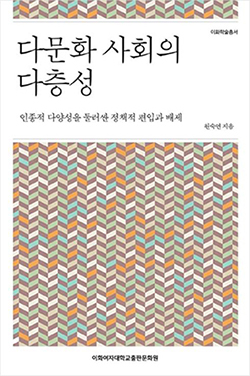본문
Multidimensionality of Multicultural Society: Focusing on Political Dynamics of Discriminate Inclusion and Exclusion

By Prof. Sookyeon Won (sywon@ewha.ac.kr)
Department of Public Administration
Recently in Korea, social conflicts related to various backgrounds such as gender, religion, and race, have arisen and sharpened over time. Among them, this book sheds light on social conflict over ‘race’ and ethnicity. As ‘Jus sanguinis’ (pure Korean for nationality based on blood) has deeply been ingrained in the Korean society, racial diversity or multi-racial society along with ‘age of immigration’ is a huge challenge in itself. Furthermore, because racial diversity has rapidly progressed in a very short time, the Korean government had to respond toward unprecedented reality in the name of ‘multicultural policy’. In a word, racial diversity is a totally different reality for the Korean society.
Given the situation, this book is keen to analyze racial diversity as an emerging and multi-layered social issue and offer relevant policy measures to respond to the emerging issue. In doing so, this book argues that racial diversity is beyond just a demographic issue which adds on a new social background to the ‘uni-racial’ Korean society. Rather, it makes a ‘political arena’ where social crash is manifested, either implicitly or explicitly, between racial majorities who are anxious to accept 'foreign' groups with different ethnic origin and minorities who urge to be recognized for their identity as a new social group.
In that sense, political dynamics between the two are paid a special attention to in this book. In a similar vein, bias or stereotypes regarding race/ethnicity such as racism, xenophobia, and ethnocentrism are uncovered in many different ways. However, different from the existing works, this book does not confine the political dynamics to a majority versus minority dichotomy. Rather, this book extends its horizon to various dynamics between minorities versus minorities as well as majorities versus majorities. In particular, minority groups are not defined as a whole with unitary interests and positions. Rather, this book defines minorities as separated groups with different variations based on their social instrumentality for the Korean society and the power of their group solidarity as a minority.
This book consists of four parts and fourteen chapters. The first part titled ‘ Multicultural society, power, and conceptual multidimensionality’ argues to apply a power perspective for understanding multicultural society and discuss conceptual confusion regarding multicultural society and diversity. The second part, ‘Critique of apolitical approach to multicultural society’, retains a critical position towards racial bias such as racism, xenophobia, and their variations and their political mobilization. In addition, it offers politics of recognition and politics of identity to overcome the limitation of apolitical approach to diversity.
Korean reality associated with multiracial diversity is shown in the third and the fourth part with ample empirical evidence. The third part titled “Multi dimensionality of political aspect for multicultural society’ discusses the context of discriminatory inclusion and exclusion based on social instrumentality that each minority group contributes. The substantial reality of discriminatory inclusion and exclusion is demonstrated in the fourth part. This part shows the extent to which Korean society as majority group differs in the level of acceptance across multiple minority groups according to the potential or present instrumentality of each minority group. Given that Korean society has been a uni-racial society for a long time, the experiences of Western countries as multiracial society can work as useful exemplar. In that sense, the fifth part addresses similarities and differences between the Korean experiences regarding multiracial society and those of its Western counterparts such as the USA. Policy implications from the comparison are discussed in depth.
Focusing on the multidimensionality of multiracial society as mentioned above, the book fills in the missing link in the Korean society as uni-racial society, theoretically and practically, and provides a much more relevant basis for policy measures to deal with new social problems as an emerging multiracial country.

* Related book
Sookyeon Won, Multidimensionality of Multicultural Society: Focusing on Political Dynamics of Discriminate Inclusion and Exclusion, Ewha Womans University Press, January, 2019, 368 pages












